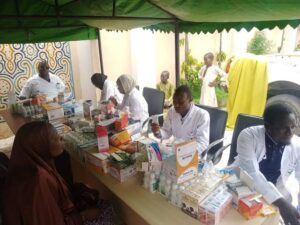


MPox: FG escalates surveillance at entry points for early detection
The Federal Government says it has intensified monitoring and screening procedures at all entry points in response to the threat of MPox.
The Coordinating Minister of Health and Social Welfare, Prof. Ali Pate, disclosed this in a statement by his Special Assistant on Media and External Relations, Mr Tashikalmah Hallah, on Thursday in Abuja.
The MPox, formerly known as monkeypox, is caused by a highly contagious and deadly monkeypox virus.
It has been causing widespread devastation in several regions of Africa, prompting the World Health Organisation (WHO) to declare it a Global Health Emergency.
This necessitated urgent and coordinated international action to contain its spread and mitigate its impact.
Pate explained that the Nigeria Centre for Disease Control (NCDC) and the Nigeria Ports Health Services, under the Federal Ministry of Health and Social Welfare, had been taking steps to fortify Nigeria’s defenses.
He added that these steps were taken even before the declaration of Mpox as a public health emergency by the Africa Centres for Disease Control and prevention.
“This Mpox Clade 1 strain has caused fatalities in up to 10 per cent of individuals who have fallen ill in previous outbreaks.
“The aim is to tackle and mitigate its impact by deploying measures similar to those used during the COVID-19 pandemic.”
Pate explained that the government had implemented a new mandate requiring all travellers to complete an online health declaration form before departing for the country.
The measure, he said, was being introduced alongside the activation of infectious disease centres in all 36 states and the Federal Capital Territory.
The minister also counselled the public to practice good hygiene, frequent hand washing with soap and water, or use an alcohol-based hand sanitiser, especially after contact with an infected person or animal.
MPox is transmitted through close contact, such as sex, skin-to-skin contact, and talking or breathing close to another infected person.
It causes flu-like symptoms and skin lesions and can be fatal, with four in 100 cases leading to death.
Outbreaks of Mpox can also be prevented and controlled with vaccines, although these are usually only available for people at risk or those in close contact with an infected person.



